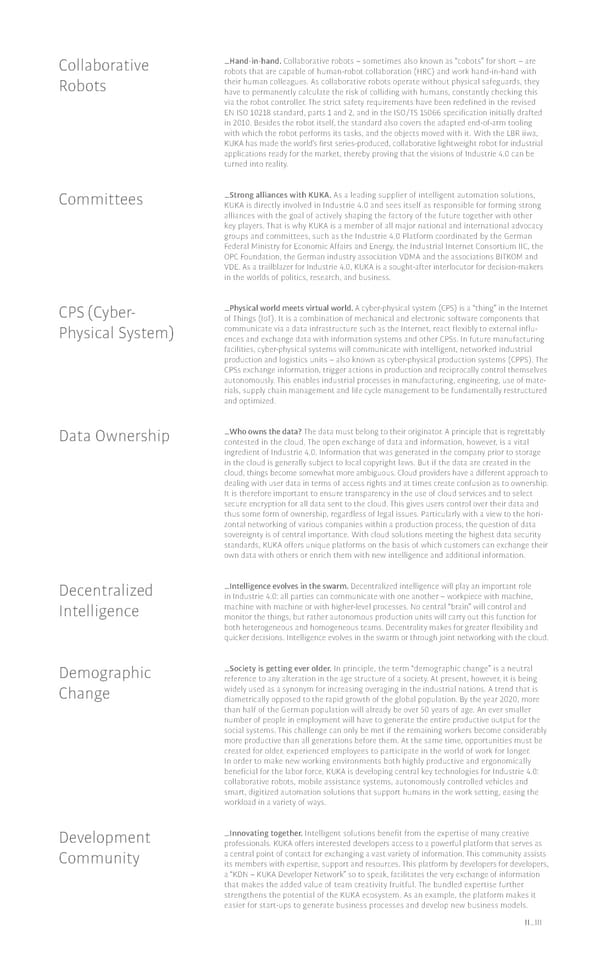Collaborative �Hand-in-hand. Collaborative robots – sometimes also known as “cobots” for short – are robots that are capable of human-robot collaboration (HRC) and work hand-in-hand with Robots their human colleagues. As collaborative robots operate without physical safeguards, they have to permanently calculate the risk of colliding with humans, constantly checking this via the robot controller. The strict safety requirements have been rede昀椀ned in the revised EN ISO 10218 standard, parts 1 and 2, and in the ISO/TS 15066 speci昀椀cation initially drafted in 2010. Besides the robot itself, the standard also covers the adapted end-of-arm tooling with which the robot performs its tasks, and the objects moved with it. With the LBR iiwa, 阀阀 has made the world’s 昀椀rst series-produced, collaborative lightweight robot for industrial applications ready for the market, thereby proving that the visions of Industrie 4.0 can be turned into reality. Committees �Strong alliances with KUKA. As a leading supplier of intelligent automation solutions, KUKA is directly involved in Industrie 4.0 and sees itself as responsible for forming strong alliances with the goal of actively shaping the factory of the future together with other key players. That is why KUKA is a member of all major national and international advocacy groups and committees, such as the Industrie 4.0 Platform coordinated by the German Federal Ministry for Economic Affairs and Energy, the Industrial Internet Consortium IIC, the OPC Foundation, the German industry association VDMA and the associations BITKOM and VDE. As a trailblazer for Industrie 4.0, KUKA is a sought-after interlocutor for decision-makers in the worlds of politics, research, and business. CPS (Cyber- �Physical world meets virtual world. A cyber-physical system (CPS) is a “thing” in the Internet of Things (IoT). It is a combination of mechanical and electronic software components that Physical System) communicate via a data infrastructure such as the Internet, react flexibly to external influ- ences and exchange data with information systems and other CPSs. In future manufacturing facilities, cyber-physical systems will communicate with intelligent, networked industrial production and logistics units – also known as cyber-physical production systems (CPPS). The CPSs exchange information, trigger actions in production and reciprocally control themselves autonomously. This enables industrial processes in manufacturing, engineering, use of mate- rials, supply chain management and life cycle management to be fundamentally restructured and optimized. Data Ownership �Who owns the data? The data must belong to their originator. A principle that is regrettably contested in the cloud. The open exchange of data and information, however, is a vital ingredient of Industrie 4.0. Information that was generated in the company prior to storage in the cloud is generally subject to local copyright laws. But if the data are created in the cloud, things become somewhat more ambiguous. Cloud providers have a different approach to dealing with user data in terms of access rights and at times create confusion as to ownership. It is therefore important to ensure transparency in the use of cloud services and to select secure encryption for all data sent to the cloud. This gives users control over their data and thus some form of ownership, regardless of legal issues. Particularly with a view to the hori- zontal networking of various companies within a production process, the question of data sovereignty is of central importance. With cloud solutions meeting the highest data security standards, KUKA offers unique platforms on the basis of which customers can exchange their own data with others or enrich them with new intelligence and additional information. Decentralized �Intelligence evolves in the swarm. Decentralized intelligence will play an important role in Industrie 4.0: all parties can communicate with one another – workpiece with machine, Intelligence machine with machine or with higher-level processes. No central “brain” will control and monitor the things, but rather autonomous production units will carry out this function for both heterogeneous and homogeneous teams. Decentrality makes for greater flexibility and quicker decisions. Intelligence evolves in the swarm or through joint networking with the cloud. Demographic �Society is getting ever older. In principle, the term “demographic change” is a neutral reference to any alteration in the age structure of a society. At present, however, it is being Change widely used as a synonym for increasing overaging in the industrial nations. A trend that is diametrically opposed to the rapid growth of the global population. By the year 2020, more than half of the German population will already be over 50 years of age. An ever smaller number of people in employment will have to generate the entire productive output for the social systems. This challenge can only be met if the remaining workers become considerably more productive than all generations before them. At the same time, opportunities must be created for older, experienced employees to participate in the world of work for longer. In order to make new working environments both highly productive and ergonomically beneficial for the labor force, KUKA is developing central key technologies for Industrie 4.0: collaborative robots, mobile assistance systems, autonomously controlled vehicles and smart, digitized automation solutions that support humans in the work setting, easing the workload in a variety of ways. Development �Innovating together. Intelligent solutions benefit from the expertise of many creative professionals. KUKA offers interested developers access to a powerful platform that serves as Community a central point of contact for exchanging a vast variety of information. This community assists its members with expertise, support and resources. This platform by developers for developers, a “KDN – KUKA Developer Network” so to speak, facilitates the very exchange of information that makes the added value of team creativity fruitful. The bundled expertise further strengthens the potential of the KUKA ecosystem. As an example, the platform makes it easier for start-ups to generate business processes and develop new business models. II�III
 Embracing Industrie Page 92 Page 94
Embracing Industrie Page 92 Page 94